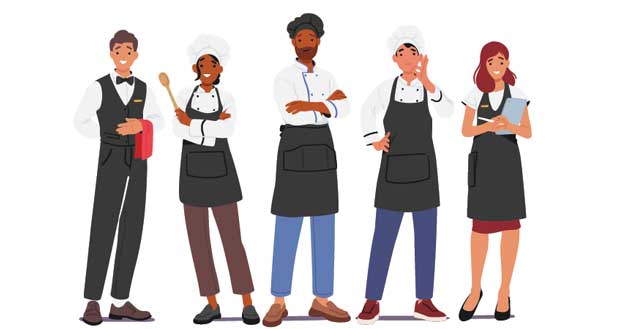According to the latest Contract Catering Tracker from CGA by NIQ and Bidfood, changes to employer NIC contributions which are due to rise this April could intensify cost challenges. How is the foodservice and hospitality sector preparing to meet these challenges?
 THE VOICE OF HOSPITALITY SECTOR’S VIEW
THE VOICE OF HOSPITALITY SECTOR’S VIEW
KATE NICHOLLS,
CHIEF EXECUTIVE, UKHOSPITALITY
One of the biggest questions facing hospitality, foodservice and catering companies this year is how the sector is going to contend with a tsunami of costs hitting in just a few months’ time?
There’s no doubt that every part of the economy was hit with additional costs in the Budget, but hospitality will disproportionately feel the brunt of the changes to employer National Insurance Contributions (NICs) and increases to wage rates in April.
That’s because, as a sector, we’re a significant employer. We provide jobs for 3.5 million people, and we pride ourselves on creating jobs for everyone – whether it’s a managerial position or something more flexible if you’re a working parent, student or carer.
And it’s those flexible roles that are being dragged into employer taxes for the first time, with more than 774,000 hospitality workers impacted. So, how can we meet this challenge? Well, it’s not easy.
With businesses having to deal with numerous challenges over the past five years, including a pandemic, record inflation, an energy crisis and staffing shortages, most of the ‘easy’ efficiencies have already been made.
Now, harder decisions are having to be made. Venues are having to consider freezing recruitment, reducing hours, cutting headcount, increasing prices and abandoning plans for investment.
Any number of these options might be taken up to ensure survival and one thing they are certain to do is curtail the growth potential of our sector, which is significant.
We saw that potential in November, when hospitality was the single biggest driver of economic growth, and we recently saw that contract caterers grew by seven per cent year-on-year in Q3 of 2024. This shows that hospitality can be the engine that drives growth.
We’re urging the Government to delay these tax increases and work with businesses on alternative measures that can mitigate the impacts on businesses and team members.
Constructive consultation is always the most productive way to move forward which can help the Government work towards its goals, but in a way that doesn’t damage businesses.
There have been recent examples of that successful approach with the Employment Rights Bill that is progressing through Parliament.
We know there are concerns about the changes that will create but through extensive engagement and discussion, there have been positive changes to the proposals. For example, access to zero hours contracts has remained, a significant move from the original proposal to ban them outright. The Government’s plan to not introduce any changes until 2026 is also positive.
I’m certain that sectors like hospitality, foodservice, catering and facilities management, which all regularly work together, can really help drive economic growth. Unfortunately, the cost and regulation being put upon us is going to act as a significant barrier to that.
I hope the Government looks at our sectors and understands the real economic, social and cultural benefit we bring in our work serving Britain and works with us to pursue policies that help our sectors both survive and thrive.
 INDEPENDENT FOODSERVICE PROVIDER’S VIEW
INDEPENDENT FOODSERVICE PROVIDER’S VIEW
SHANE KAVANAGH,
REGIONAL MANAGING DIRECTOR, BAXTERSTOREY
Sometimes it feels like it just keeps coming – hospitality has seen a seemingly endless procession of cost headwinds and challenges over recent years, and the latest budget has certainly helped to compound this. The impending rise in employers; National Insurance and the lowering of the threshold at which it becomes payable has added to the pressure which is already facing the sector on many fronts.
Alongside wage inflation and the challenge of employers National Insurance, food inflation remains problematic, driven by global supply challenges and conflict, and the attraction of talent to the sector remains a key focus.
However, the last few years have proven that as a sector we are nothing if not inventive and agile, and there are signs of optimism out there for those looking for them. CGA’s contract catering tracker showed seven per cent year-on-year growth for contract catering operators, and continued sales growth is the solution many operators are looking for.
Across the sector we are seeing operators take a more commercially minded approach, bringing a real competitive high street mindset to client sites to support driving sales.
Also, while consumer confidence is challenging, we are seeing an increase in companies asking employees to spend more time in the office.
Many companies are introducing a five-day week in the office policy, and multiple companies are enforcing similar three or four-day a week policy, all of which bodes well for B&I (business and industry) catering operators reliant on regular customers to drive revenue. The research all points to increased productivity for companies with more ‘facetime’ with their teams.
Alongside this, the leisure sector continues to perform well overall, with consumers continuing to seek out unique experiences, often involving an F&B (food and beverage) experience along the way. Sector operators continue to be agile in how they shape their business and staffing, and we see increasing flexibility in how teams are deployed to meet the peaks of consumer demand.
However, hoping you can grow sales is unlikely to be enough, and increasingly the sector is looking towards technology to offer solutions to offset some of the rising cost challenges.
Omnichannel ordering and payment solutions such as Kanpla and Dynamify help operators connect more closely with their customers, and innovations such as AI tray scanning tills and frictionless stores such as Amazon’s Just Walk Out tech offer alternative approaches to retailing which can deliver high volumes while needing less staff to operate. These solutions may not be right for every location, but they have been proven to be highly effective in some environments, and the pace of development and evolution is increasing.
Creativity, agility and a willingness to embrace change have defined the sector over recent years as we’ve navigated Brexit, Covid and a period of intense food and energy cost inflation.
There is no doubt that this latest wave of headwinds will put many organisations under great pressure, but I expect we will see the sector continue to focus on delivering great food and experiences and innovate quickly along the way in response to whatever comes next. If any sector can adapt and evolve successfully, it’s ours.





